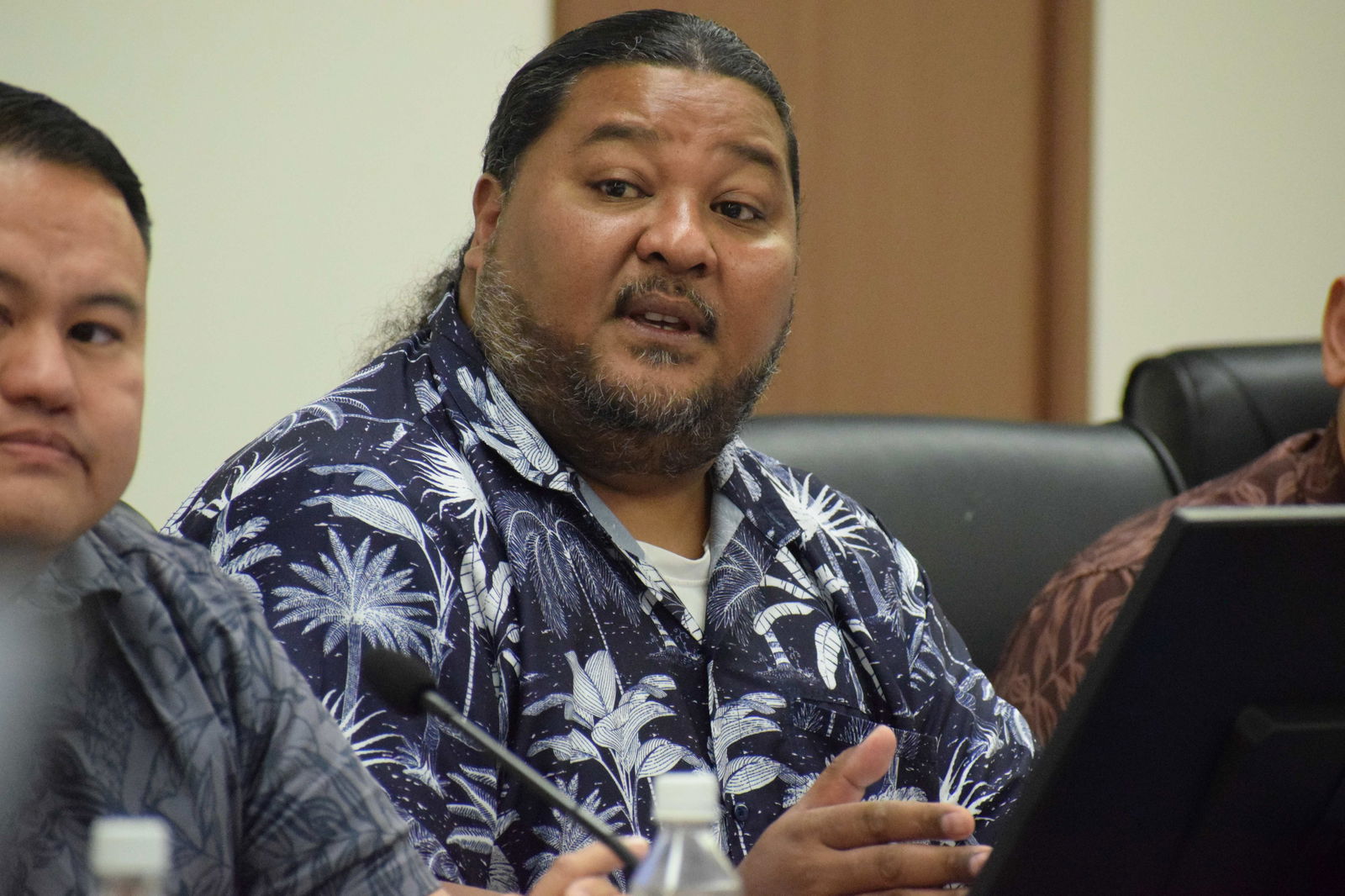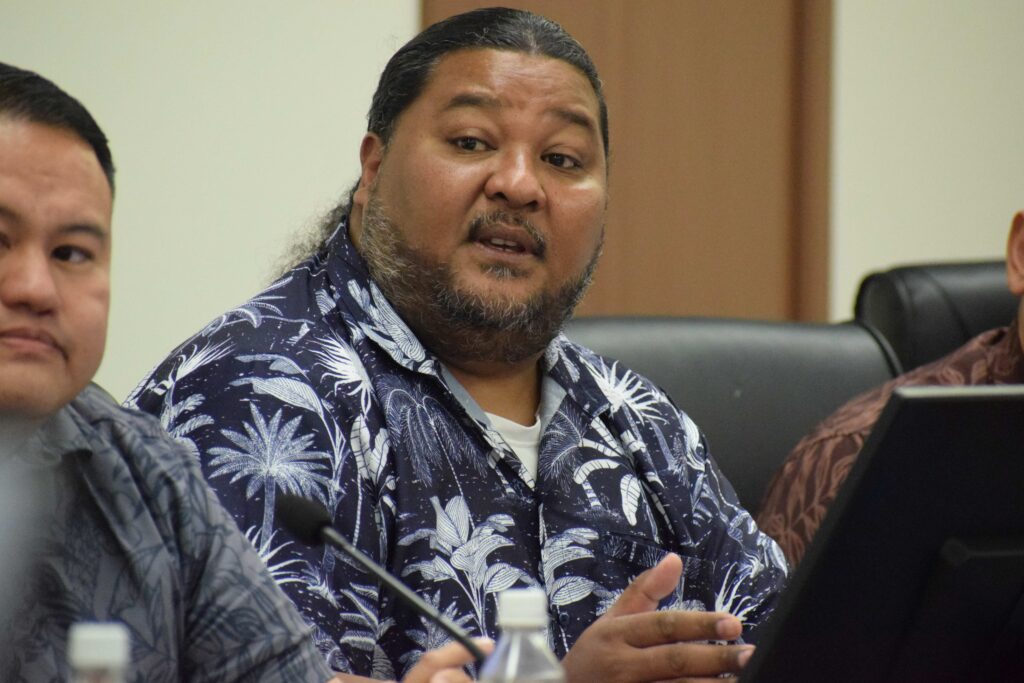
Senate Vice President Karl King-Nabors asks a question during a bicameral conference committee meeting in the House chamber on Tuesday.
Photo by Emmanuel T. Erediano
SENATE Vice President Karl King-Nabors on Tuesday expressed his opposition to Gov. Arnold I. Palacios’ Executive Order 2025-2, which abolishes the Commonwealth Casino Commission. He described it as an “executive overreach,” “disastrous,” and a “direct contradiction to the fundamental ideals of our Constitution and form of government.”
Issued on May 30, 2025, the EO transfers to the Lottery Commission the duties, responsibilities and the authority of CCC to enforce the casino license agreement. The EO also terminates the casino commissioners.
The House of Representatives and the Senate have 60 days to either approve, disapprove or modify the EO.
According to the governor, the lone exclusive casino license holder, Imperial Pacific International, ceased operations in 2020 “rendering the Casino Commission’s regulatory function inactive for more than five years and into the foreseeable future.”
In a statement on Tuesday, King-Nabors said the EO is an attempt “to alter statutory authority” between CCC and the Lottery Commission “in direct conflict with the two statutes that govern those two bodies.”
He said the CNMI Constitution “clearly outlines the separation of powers, and it’s crucial that we uphold these principles.” He said the EO “cannot unilaterally change statutory authority; it requires legislative action.”
He said the governor’s intent to transfer the regulatory authority from CCC to the Lottery Commission “was not envisioned by the existing statutes.”
He added that “only the legislative branch has the power to amend such statutory frameworks, ensuring that checks and balances are respected.”
“To compound its attempt to usurp the duties of the legislative branch, the Executive Order flaunts the plain language of our Constitution when it states that the economic conditions of the Commonwealth and the legal issues facing the sole casino licensee would equate to the termination for cause of the Casino Commissioners,” King-Nabors said.
He said Article III Section 21 of the CNMI Constitution defines “cause” as “gross neglect or dereliction of duty, breach of fiduciary duty, conviction of a felony, or mental or physical incapacity.”
The EO, he said, makes no mention of any grounds that would rise to the level of termination for cause.
“This action alone exposes the Commonwealth government to significant legal liability that we cannot afford. Commissioners are given this protection in our Constitution to guarantee some degree of independence from the political influence of the Governor. The Governor is attempting to circumvent this protection.”
To do so, King-Nabors added, the governor wants to remove from those in positions requiring independent decision-making the protections against “arbitrary and capricious actions by the Governor.”
He said that if the EO is allowed to stand, the results for the Commonwealth “will be disastrous,” and will lead to the following negative consequences:
1) Legal Challenges. Stakeholders may contest the Executive Order, arguing it violates constitutional and contractual obligations. Any action taken by the Lottery Commission under the authority of the Executive Order will be considered null and void as it lacks statutory authority to act under the Casino Commission enacting statute. Every action taken will impact someone negatively. Whoever that might be, they will have a cause of action to overturn that action by the Lottery Commission, even if that action was in the best interest of the Commonwealth. We will have to contend with the expense and uncertainty of every single action purportedly made under the authority of this unconstitutional Executive Order.
2) Regulatory Confusion. The Lottery Commission, lacking casino regulation expertise, cannot be expected to understand the current demands of the Commonwealth casino framework. They are incapable of regulating in a rational manner, in light of their ignorance of the casino regulations, the process of promulgating regulations for casinos, the current legal framework that arises from bankruptcy of licensees, and the enormous organizational knowledge that only the Casino Commission possesses. Such ignorance in the face of such a complicated framework is a recipe for creating chaos in governance.
(The Lottery Commission is composed of the secretaries of the Department of Finance and the Department of Commerce and the commissioner of the Department of Public Safety.)
3) Contractual Breaches. The Executive Order will jeopardize agreements with entities like current and future licensees, affecting ongoing legal and financial proceedings. The Lottery Commission does not have the statutory authority to enter into any agreements on behalf of the Commonwealth. If they attempt to do so, the contract can be challenged successfully at any time by any party.
4) Precedent for Overreach. If left unchecked, the Executive Order will set a precedent for future executive overreach, threatening the stability of statutory governance and the ideal of check and balances fundamental to our government. It will also erode one of the core principles of our Constitution, which is to protect our commissioners from inappropriate pressure from the Governor.
King-Nabors urged all lawmakers to carefully scrutinize the governor’s EO “and its impacts on our form of government. It is our duty as the elected members of the legislative branch to craft and promulgate laws our constituents demand and need.”
The EO, he said, “seeks to take that duty away from the legislative branch and forever place it in the hands of the executive branch.”
“We, as the Legislature, have the capacity and the authority to address changes to the laws we have already passed. The governor is invited to submit his suggestions and proposed changes to us in order to develop a collaborative response to an ever-changing landscape. However, it is never appropriate to act in direct contradiction to the fundamental ideals of our Constitution and form of government,” King-Nabors said.
Variety was unable to get a comment from the governor’s office.











